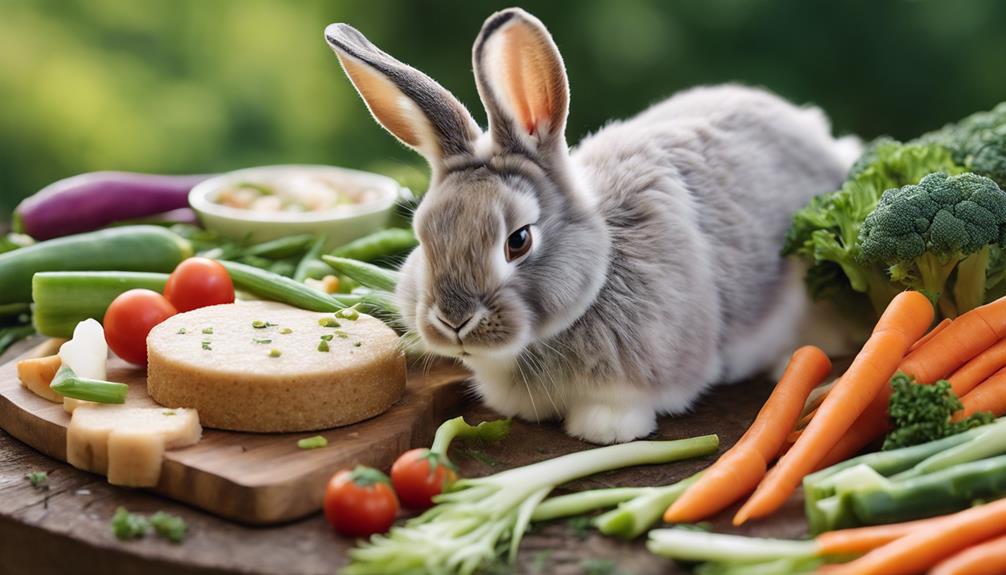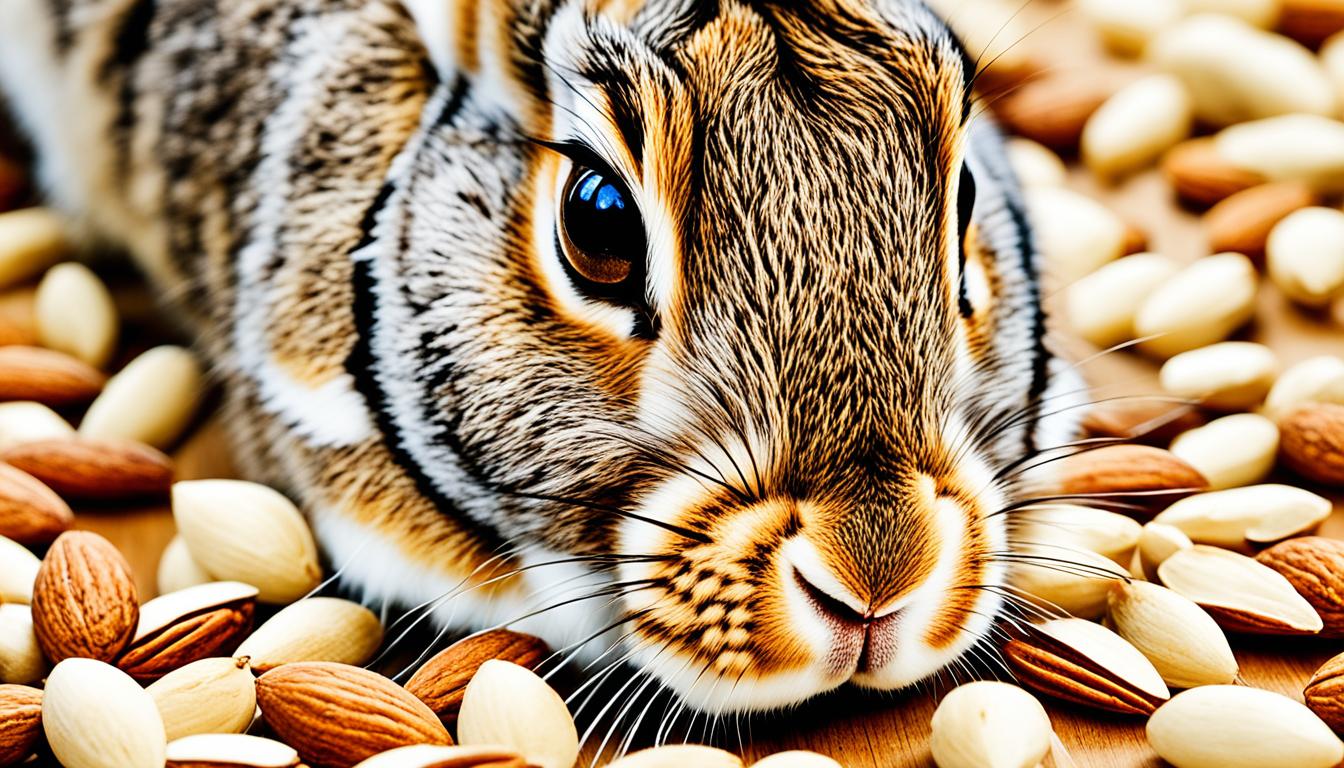Did you know that pomegranates can offer many health advantages to rabbits? Despite being unexpected, this tasty fruit is not only suitable for rabbits to consume but is also rich in crucial nutrients. This article will delve into the nutritional benefits of pomegranates for rabbits, address their safety, and offer safe feeding advice to guarantee your furry companion can indulge in this treat without any risks to their health.
Key Takeaways:
- Pomegranates can be a safe and healthy occasional treat for rabbits.
- They are rich in antioxidants, high in vitamin C, and a good source of dietary fiber.
- Monitor your rabbit’s weight and gut health when offering pomegranates, and limit consumption for rabbits prone to obesity or gastrointestinal issues.
- The recommended serving size for pomegranates is 1-2 arils, given twice a week.
- Pomegranates should be balanced with other healthy foods in a rabbit’s diet, such as hay and leafy greens.
The Nutritional Value of Pomegranates for Rabbits
When it comes to the nutritional value of pomegranates for rabbits, these vibrant fruits offer a variety of health benefits. Pomegranates are not only delicious but also packed with essential nutrients that can support your rabbit’s overall well-being.
Here are some key nutritional components of pomegranates:
Vitamins
Pomegranates are rich in vitamins, including:
- Vitamin C: Supports the immune system and promotes tissue health and repair.
- Vitamin K: Essential for blood clotting and bone health.
- Folate: Important for cell division and growth.
Antioxidants
Pomegranates are known for their antioxidant properties. Antioxidants help protect cells from damage caused by harmful free radicals, reducing the risk of certain diseases and promoting overall health.
Minerals
Pomegranates contain important minerals such as potassium, which plays a role in maintaining healthy blood pressure, and copper, which aids in the production of red blood cells.
Fiber
Pomegranates are a good source of dietary fiber, which promotes healthy digestion and can help prevent gastrointestinal issues in rabbits.
While pomegranates offer a range of nutrients, it’s important to note that they also have a high sugar content. Therefore, it’s essential to feed pomegranates to rabbits in limited quantities.
To get a better understanding of the nutritional value of pomegranates, take a look at the table below:
| Nutrient | Amount per 100g |
|---|---|
| Protein | 1.5g |
| Fat | 0.3g |
| Carbohydrates | 17g |
| Sugar | 13g |
| Dietary Fiber | 4g |
| Vitamin C | 9.7mg |
| Vitamin K | 16.4mcg |
| Folate | 38mcg |
| Potassium | 236mg |
| Copper | 0.2mg |

Remember to always monitor your rabbit’s weight and overall health when introducing new foods into their diet. While pomegranates can offer nutritional benefits, moderation is key to ensure a well-balanced and healthy bunny.
Are Pomegranates Safe for Rabbits to Eat?
Yes, pomegranates are safe for rabbits to eat in moderation. All parts of the pomegranate fruit are non-toxic for rabbits, and the soft arils do not pose a choking hazard. However, caution should be exercised with other parts of the pomegranate plant, such as the seeds, peel, rind, roots, and bark, as they may contain toxins or tannins that could upset a rabbit’s digestion. It is best to only offer the seed pods, or arils, of the pomegranate as a treat to rabbits.
If you are unsure about introducing pomegranates to your rabbit’s diet, consult with a veterinarian experienced in rabbit care. They can provide further guidance based on your rabbit’s specific needs and health condition.
Remember: Always introduce new foods gradually and monitor your rabbit’s reaction. If you notice any signs of digestive upset or adverse reactions, discontinue feeding pomegranates immediately and consult a veterinarian.
Below is a table summarizing the safety of different parts of the pomegranate plant for rabbits:
| Pomegranate Plant Part | Safety for Rabbits |
|---|---|
| Arils (Seed Pods) | Safe and non-toxic |
| Seeds | May contain toxins in trace amounts, but rarely in quantities that can sicken a rabbit |
| Peel and Rind | Contains tannins that could cause stomach upset if consumed in large amounts |
| Roots and Bark | Toxic due to alkaloid content; can cause heart and nerve issues |
As a responsible rabbit owner, it’s important to prioritize your pet’s health and well-being. Providing a varied and balanced diet, supplemented with safe and appropriate treats like pomegranates, can contribute to the overall health and happiness of your furry friend.

Serving Sizes and Frequency for Feeding Pomegranates to Rabbits
In order to ensure the health and well-being of your furry friend, it is important to understand the correct serving sizes and frequency when feeding pomegranates to rabbits. While pomegranates offer various health benefits, they should be given in moderation due to their high sugar content. Here are some guidelines to follow:
Serving Sizes:
- Recommended serving size: 1-2 arils
- Offer 1-2 arils per serving
The size of a pomegranate aril can vary, but on average, one aril is equivalent to approximately 1 teaspoon. Therefore, providing 1-2 arils per serving ensures a controlled intake of sugar and prevents excessive consumption.
Frequency:
- Feeding frequency: Twice a week
- Offer pomegranates to rabbits twice a week
Rabbits should only be given pomegranates as an occasional treat. Feeding them twice a week strikes a balance between providing the nutritional benefits of pomegranates without overloading their diet with sugar. Remember, moderation is key.
It is essential to monitor your rabbit’s weight and gut health when introducing pomegranates into their diet. Be observant for any signs of issues such as obesity, soft stools, or a reduced appetite. If these problems arise, it is advisable to stop feeding pomegranates immediately and consult a veterinarian.
Pro tip: Before offering pomegranates to your rabbit, ensure that you rinse the arils thoroughly to remove any traces of pesticides or contaminants.
By following these serving size and frequency recommendations, you can safely incorporate pomegranates into your rabbit’s diet as a nutritious and enjoyable treat.
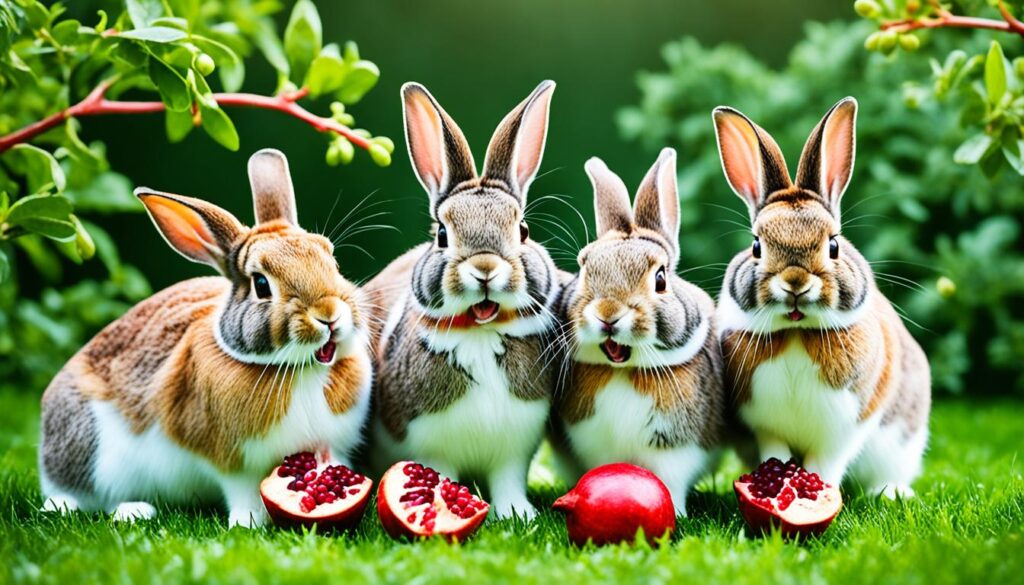
Pomegranate Plant Safety and Precautions
While pomegranate fruit is safe for rabbits to eat, it’s important to be cautious when it comes to other parts of the plant. The seeds of the pomegranate may contain trace amounts of toxins, but these are rarely present in amounts that can harm a rabbit. However, it’s crucial to note that the peel and rind of the pomegranate contain tannins that could potentially cause stomach upset if consumed in large quantities. Additionally, the roots and bark of the plant are toxic due to alkaloid content and can lead to heart and nerve issues in rabbits.
To ensure the safety of your furry friend, it’s best to restrict their access to these parts of the plant and offer only the fruit as a treat. By doing so, you can enjoy the benefits of pomegranates without putting your rabbit’s health at risk.
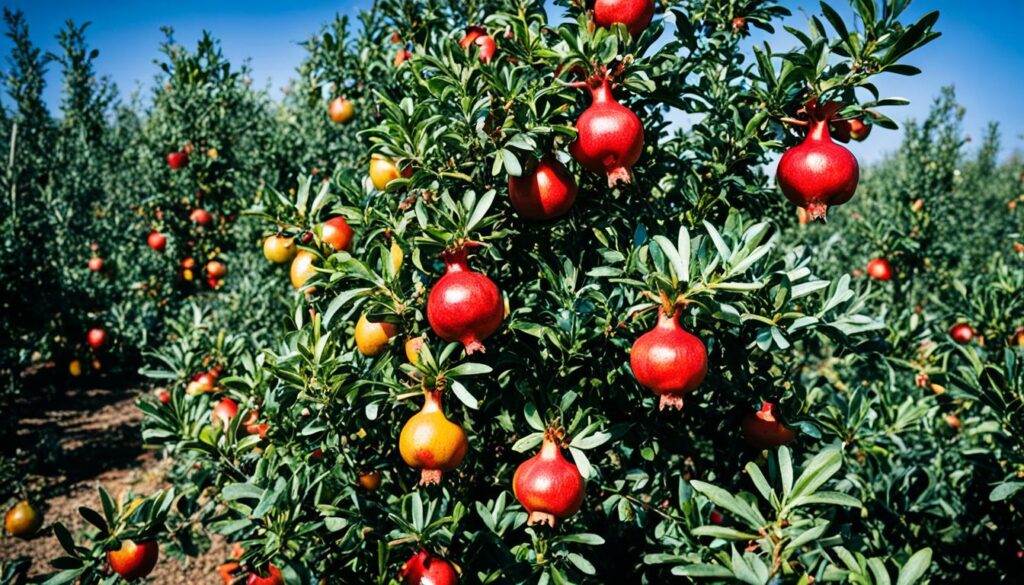
Precautions for Rabbits
When it comes to feeding pomegranates to rabbits, it’s important to take certain precautions. Here are a few tips to keep in mind:
- Always remove any seeds from the pomegranate before offering it to your rabbit, as the seeds can pose a choking hazard.
- Limit the amount of pomegranate you feed your rabbit to prevent excessive sugar intake, as pomegranates are relatively high in sugar.
- Monitor your rabbit’s weight and gut health to ensure they are tolerating pomegranate well. If you notice any signs of digestive issues, such as soft stools or reduced appetite, it’s best to stop feeding pomegranate.
Following these precautions will help keep your rabbit safe and healthy while enjoying the occasional pomegranate treat.
| Pomegranate Plant Safety and Precautions | Precautions for Rabbits |
|---|---|
| – The seeds of the pomegranate may contain trace amounts of toxins, but are rarely harmful to rabbits. | – Always remove the seeds to avoid choking hazards. |
| – The peel and rind of the pomegranate contain tannins that can cause stomach upset if consumed in large quantities. | – Limit the amount of pomegranate to prevent excessive sugar intake. |
| – The roots and bark of the plant are toxic due to alkaloid content and can lead to heart and nerve issues. | – Monitor your rabbit’s weight and gut health for any signs of digestive issues. |
| – Restrict access to the toxic parts of the plant and offer only the fruit as a treat. |
Pomegranate Calories and Sugar Content
When it comes to pomegranates, it’s important to consider their calorie and sugar content in relation to your rabbit’s diet. Pomegranates contain approximately 13g of sugar per 100g, which makes them a sweet treat for our furry friends. However, this also means that they should be fed in moderation to avoid excessive sugar intake.
We need to be mindful of our rabbit’s weight and gut health when offering pomegranates. Too much sugar can lead to weight gain, dental issues, or digestive problems. To compensate for the sugar content, it’s recommended to reduce other sugary foods in your rabbit’s diet and ensure they have a well-balanced nutritional intake.
Pomegranates, despite their sugar content, also offer several health benefits to rabbits. They are rich in fiber, vitamins, minerals, and water, which are essential for their overall well-being. When given in appropriate quantities, pomegranates can still be a healthy choice for your rabbit.
Nutritional Value of Pomegranates for Rabbits
| Nutrient | Amount per 100g |
|---|---|
| Calories | 83 kcal |
| Sugar | 13g |
| Fiber | 4g |
| Vitamin C | 10.2mg |
| Potassium | 236mg |
As seen in the table above, pomegranates provide a modest number of calories (83 kcal) and a relatively high amount of fiber (4g). They are also a good source of vitamin C and potassium, which are important for maintaining a healthy immune system and supporting heart health.
Pomegranates are a delightful treat for our rabbits, but like any treat, moderation is key. Keeping an eye on their weight and gut health allows us to offer them the benefits of pomegranates without the risk of sugar-related health issues.
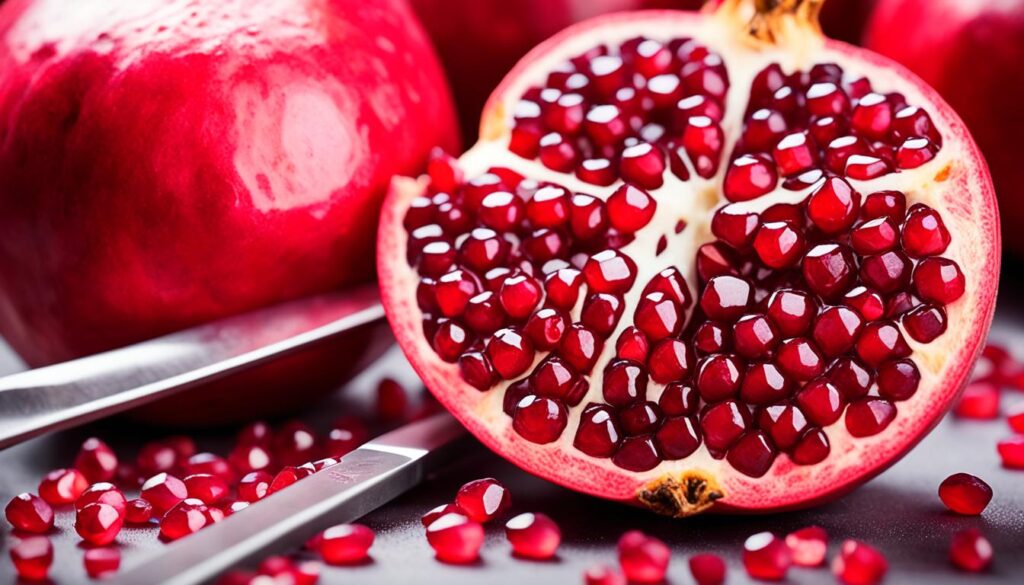
With the right approach, pomegranates can be a tasty addition to your rabbit’s diet. Just remember to offer them in appropriate quantities and alongside a balanced meal plan that includes plenty of hay, leafy greens, and other rabbit-safe vegetables.
Feeding Pomegranates to Baby Rabbits and Dwarf Breeds
When it comes to feeding pomegranates to baby rabbits, it’s important to introduce them at the right time. Once your baby rabbit has transitioned to eating vegetables and hay at around 12 weeks old, you can start offering small pieces of pomegranate as a treat. This allows you to check for any potential allergies or digestive issues that your rabbit may have. It’s always best to start small and monitor their reaction before increasing the serving size.
As your baby rabbit grows and reaches 6-12 months old, you can gradually introduce larger serving sizes of pomegranates. However, it’s crucial to keep in mind that treats, including pomegranates, should be given in moderation to prevent any negative effects on their health, particularly their dental health.
Similarly, dwarf breeds can enjoy pomegranates as an occasional treat. These delightful little rabbits can benefit from the nutritional value of pomegranates just like any other breed. However, it’s essential to remember that treats should make up only a small portion of their diet. The majority of their diet should consist of hay and low-calorie vegetables.
By incorporating pomegranates into the diet of baby rabbits and dwarf breeds, you can offer them a tasty and nutritious treat that adds variety to their meals. Just remember to keep the treat size appropriate, observe any reactions or allergies, and prioritize a balanced diet of hay and veggies for their overall well-being.
| Feeding Pomegranates to Baby Rabbits and Dwarf Breeds |
|---|
| Start feeding pomegranates to baby rabbits after they transition to eating vegetables and hay at 12 weeks old. |
| Begin with small pieces to check for allergies or digestive issues. |
| Gradually increase serving sizes once your baby rabbit reaches 6-12 months old. |
| Limit treats to protect dental health and focus on providing hay and low-calorie veggies. |
| Dwarf breeds can also enjoy pomegranates in moderation as an occasional treat. |

Healthy Foods to Feed Alongside Pomegranates
Pomegranates are a great addition to a rabbit’s diet, but they should be balanced with other healthy foods to ensure a well-rounded nutrition. Here are some options to consider:
Hay:
The majority of a rabbit’s diet should consist of hay. Choose from varieties such as grass, oat, timothy, or orchard grass. Hay provides essential fiber for digestive health and helps wear down their constantly growing teeth.
Leafy Greens:
Incorporating leafy greens into your rabbit’s diet is essential. Some options to consider include romaine lettuce, red/green leaf lettuce, parsley, and cilantro. These greens provide important vitamins and minerals.
Vegetables:
Other vegetables can be included in a rabbit’s diet to provide a variety of nutrients. Carrots, broccoli, celery, zucchini, and squash are excellent options. Vegetables offer additional vitamins and minerals to support overall health.
Pellets:
Limited amounts of pellets can be included in a rabbit’s diet for balanced nutrition. Look for high-quality pellets specifically formulated for rabbits, and follow the recommended serving size to avoid overfeeding.
It’s important to note that the proportions of each food group may vary slightly depending on your rabbit’s individual needs and dietary restrictions. However, a general guideline is to aim for 80% of the diet from hay, 10-15% from vegetables, and only 5% from fruits and starchy vegetables.
Remember to introduce new foods gradually and monitor your rabbit’s response. If any digestive issues or allergies occur, consult with a veterinarian for guidance.
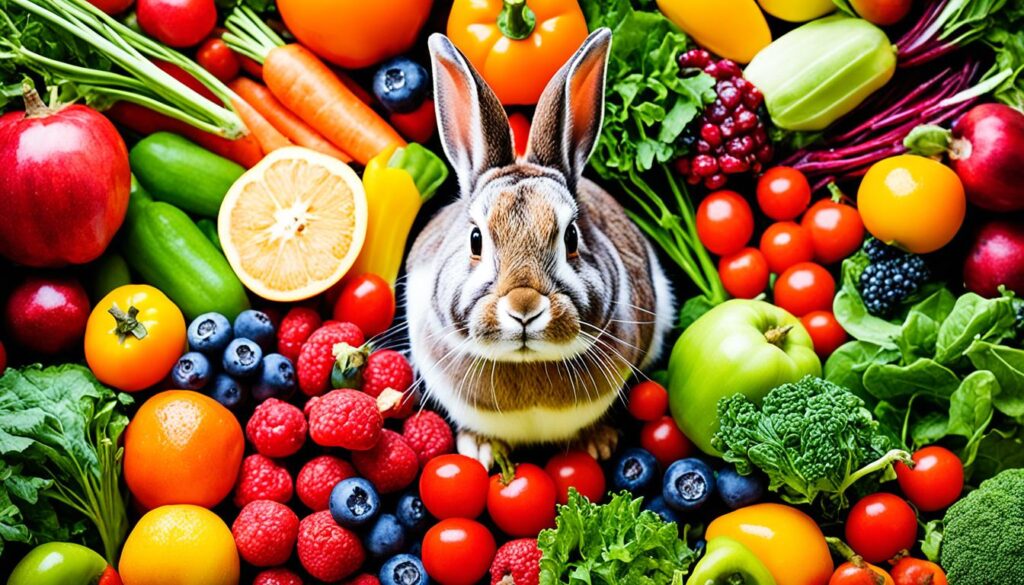
| Food Group | Examples | Benefits |
|---|---|---|
| Hay | Grass, oat, timothy, orchard grass | Provides fiber for digestive health, helps wear down teeth |
| Leafy Greens | Romaine lettuce, red/green leaf lettuce, parsley, cilantro | Offers vitamins and minerals |
| Vegetables | Carrots, broccoli, celery, zucchini, squash | Provides additional nutrients |
| Pellets | High-quality rabbit pellets | Supplies balanced nutrition in limited amounts |
Alternatives to Pomegranates for Rabbits
If your rabbit cannot tolerate pomegranates or if you’re looking for lower sugar options, there are alternatives available. Instead of pomegranates, you can offer lower sugar fruits as special treats for your rabbit. Some suitable options include:
- Blueberries: These tiny berries are packed with antioxidants and are lower in sugar compared to pomegranates.
- Apples: Apples are a crunchy and refreshing choice for rabbits. Be sure to remove the seeds and core before giving them to your furry friend.
It’s also important to consider incorporating lower sugar vegetables into your rabbit’s diet. These options can provide essential fiber, vitamins, and minerals without excessive sugar. Some suitable vegetables include:
- Leafy greens: Romaine lettuce, red/green leaf lettuce, parsley, and cilantro are all excellent choices that offer nutritional value without high sugar content.
- Carrots: Carrots are a well-known favorite among rabbits and can be given to them in moderation for a tasty treat.
- Celery: The crunchy texture of celery can provide a fun and healthy snack for your rabbit.
When selecting alternative treats for your rabbit, it’s important to consider their individual dietary needs and preferences. Always introduce new foods gradually, and monitor your rabbit’s response to ensure they tolerate them well. Remember, treats should be given in moderation and balanced with a diet primarily consisting of hay and vegetables.

Conclusion
In conclusion, rabbits can safely enjoy pomegranates as an occasional treat. These delicious fruits provide a range of health benefits, including antioxidants, fiber, and essential vitamins and minerals. However, it is important to remember that pomegranates are high in sugar, so it’s crucial to feed them in moderation.
Monitoring your rabbit’s weight and gut health is essential when offering pomegranates. Adjust their diet accordingly and consult with a veterinarian if needed. By incorporating pomegranates into a well-balanced diet and adapting to your rabbit’s individual needs, you can provide them with a tasty and beneficial treat.
Remember, a healthy diet for rabbits consists mainly of hay, leafy greens, and limited amounts of fruit. While pomegranates can be a delightful addition, it’s crucial to prioritize their overall nutrition and well-being. So, go ahead and treat your furry friend to some pomegranate goodness, but always keep moderation in mind!



